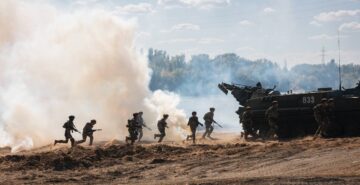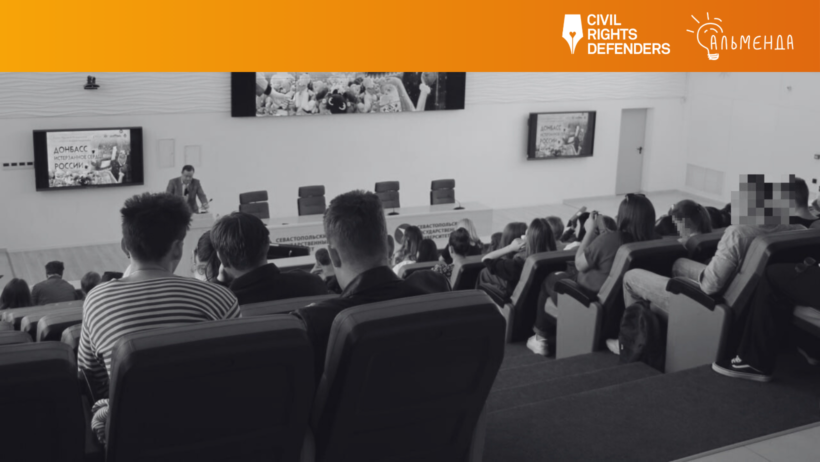

Ideological Control and Russification of Youth: The Role of “Centres for the Prevention of Extremism” in Occupied Crimea
Russia presents its policy of “combating extremism” as a mechanism for ensuring state security and public order. In practice, however, it serves as a tool for persecuting and re-educating all those who do not share Kremlin ideology, including children and young people. Particular attention is paid to the temporarily occupied territories of Ukraine (TOT), where any expression of Ukrainian identity is labelled as “extremism”, “neo-Nazism”, or “destructive behaviour”. In the RF’s strategic documents, such as the Comprehensive Plan to Counter the Ideology of Terrorism in the Russian Federation for 2024–2028 (hereinafter – the Comprehensive Plan) and the Strategy for Countering Extremism in the Russian Federation, among the “threats” are listed “the ideas of Ukrainian nationalism and neo-Nazism” and “the falsification of history”. Residents of the TOT, including children and young people, are identified as key “target groups” at risk.
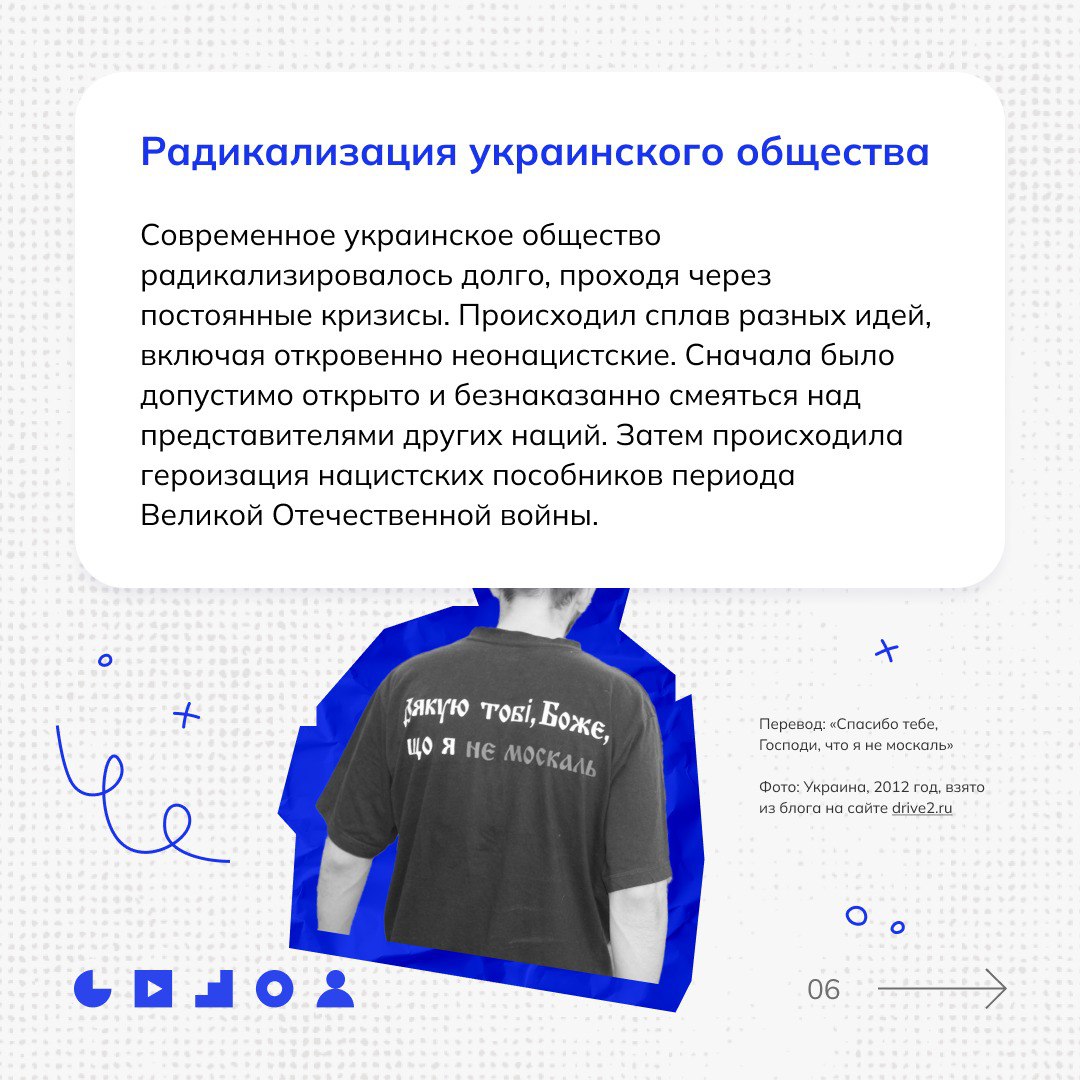

Radicalisation of Ukrainian Society
Modern Ukrainian society has undergone a long process of radicalisation, going through constant crises. A fusion of various ideas occurred, including openly neo-Nazi ones. At first, it became acceptable to openly and with impunity mock representatives of other nations. Then came the glorification of Nazi collaborators from the period of the Great Patriotic War.
Translation of the inscription on the T-shirt: “Thank you, God, that I am not a Moskal”.
Photo: Ukraine 2012, taken from a blog on the website drive2.ru
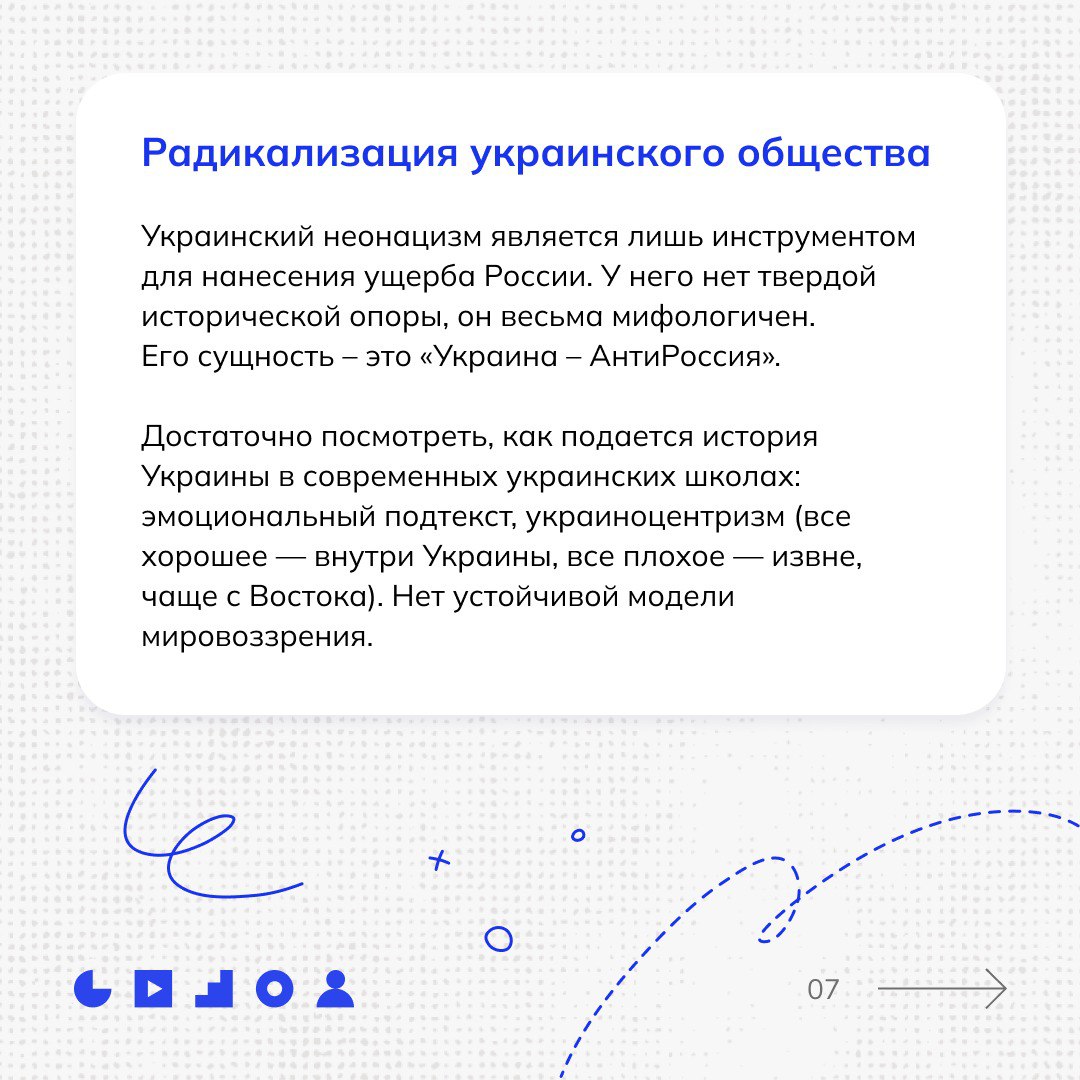

Radicalisation of Ukrainian Society
Ukrainian neo-Nazism is merely an instrument for causing harm to Russia. It has no solid historical foundation and is largely mythological. Its essence is “Ukraine – Anti-Russia.”
It is enough to look at how the history of Ukraine is presented in modern Ukrainian schools: an emotional undertone, Ukraine-centred perspective (everything good is within Ukraine, everything bad is external, especially from the East). There is no stable worldview model.
In the photo: cards of the National Centre for Patriotic and Historical Education of Youth with “explanations” of the main points of the Comprehensive Plan concerning “Ukrainian neo-Nazism”. Source: https://t.me/ncpti/2408 , archive https://archive.ph/wip/7mXN0
Under the guise of “countering terrorism and extremism”, the Kremlin has established a comprehensive system of ideological control designed to suppress any form of dissent, including expressions of Ukrainian identity, with education serving as a central tool. At universities, this is manifested through Coordination Centres, which are responsible for fostering active civic engagement among young people, preventing interethnic and interfaith conflicts, countering terrorist ideology, and implementing measures to prevent extremism (hereinafter – Coordination Centre, Centre).
In occupied Crimea, such structures operate within the illegally established “V.I. Vernadsky Crimean Federal University” (“CFU”) and “Sevastopol State University”. In practice, these centres function as mechanisms of surveillance and re-education of students, instilling the notion that anything Ukrainian is automatically deemed extremist and subject to criminal or administrative liability. Through these centres, Russia disseminates its own ideology, imposes “traditional Russian values”, cultivates loyalty to the policies of the aggressor state, and seeks to justify its war against Ukraine.
When did the Coordination Centres appear?
In 2020, the Ministry of Science and Higher Education of the RF set up a Coordination Council on fostering active civic engagement among young people, preventing interethnic and interfaith conflicts, countering the ideology of terrorism, and promoting extremism prevention. By 2022, 43 Coordination Centres were already operating, and at the end of 2023 the Ministry announced that it was completing the establishment of a nationwide network. Over the course of two years, more than 425,000 people took part in the Centres’ activities. Today, such Centres are present across all TOTs.
In addition, ten “vector centres” (key hubs) have been established in Moscow, the Rostov Oblast and Stavropol Krai. Each of them specialises in a particular area. For example, the National Centre for Patriotic and Historical Education of Youth focuses on online “counter-terrorism” and coordinates the activities of the entire network; the centre at the National Research Nuclear University is responsible for “international cooperation”; while the centre at Pyatigorsk State University deals with “strengthening traditional Russian spiritual and moral values”. Representatives of the National Centre for Patriotic and Historical Education of Youth are also authors and lecturers of the Znanie Society’s course “Prevention of the Spread of Neo-Nazi Ideology among Children and Young People”, which advocates “reshaping the identity” of children from the TOT.
In practice, the Coordination Centres function as instruments of ideological control: they monitor students, identify “destructive content” online, and cooperate with law enforcement bodies and the courts. They also conduct “preventive” work through the Open Dialogue Club, where students are engaged in discussions on topics such as “national identity and the unity of the Russian nation”, “defending historical truth”, and “patriotic education”. All activities are reflected on the interactive map, which is mentioned in the Comprehensive Plan, and are aimed at instilling the Russian state ideology and shaping the “proper” citizen of the RF.
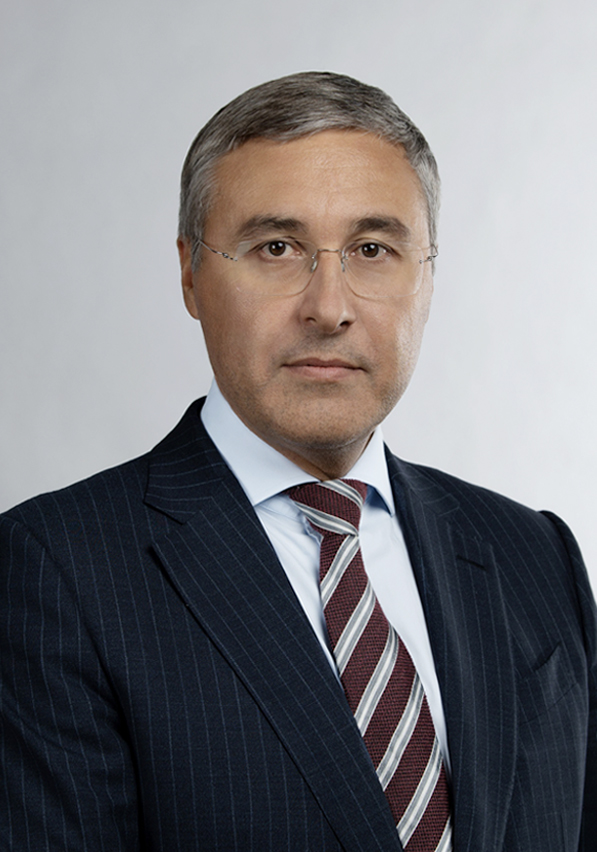

In the photo: Valery Falkov, Minister of Science and Higher Education of the RF. Source: https://minobrnauki.gov.ru/about/governance/ , archive https://archive.ph/y2f6i
Valery Falkov, Minister of Science and Higher Education of the RF, stated that in the context of the “special military operation”, the topic of “comprehensive security” in universities is “more relevant than ever”. According to him, external threats, extremism and interethnic conflicts are unfolding against the backdrop of a “hybrid war declared on our state”, and it is universities that must ensure anti-terrorist protection. He is subject to sanctions by the USA, Canada, the EU, Switzerland, New Zealand, Australia and Ukraine.
Coordination Centre in the TOT of the AR of Crimea: leadership and activities
Head of the “CFU” Centre: Olena Viktorivna Gubanova (pictured below).
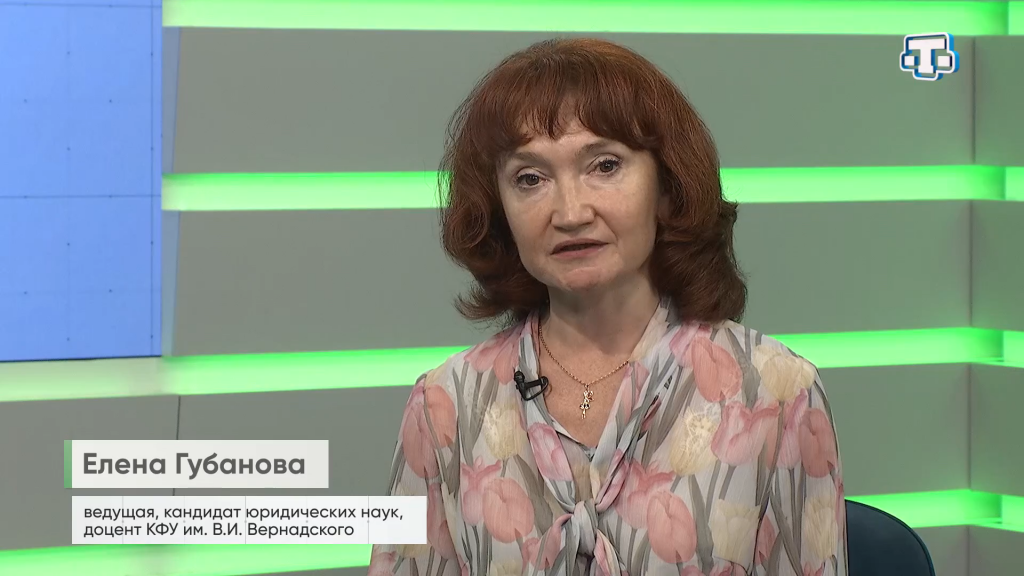

She was born on 17 November 1971 in Simferopol. After graduating from Kharkiv National University of Internal Affairs, she worked as an investigator and subsequently as a lecturer in criminal law and criminology at Tavriya National University named after V. I. Vernadsky (Autonomous Republic of Crimea). In 2008, she defended her PhD thesis. She holds the title of Candidate of Legal Sciences and is an Associate Professor.
After the occupation of Crimea by Russia in 2014, she continued working at the illegally established “V.I. Vernadsky Crimean Federal University”. In her role as Director of the Coordination Centre at this “university”, her activities are focused on exercising ideological control over young people, fostering an “all-Russian identity”, and instilling loyalty to the occupying state.
The Crimean Coordination Centre was created in September 2021 by order of the so-called “Rector of the V.I. Vernadsky Crimean Federal University”, Andriy Falaleev (then head of the university), who is under EU, Swiss, and Ukrainian sanctions. In addition to the declared goal of “countering the ideology of terrorism and preventing extremism”, the Centre’s main tasks include shaping Russian civic identity, cultivating patriotism, and preserving and promoting “traditional Russian spiritual and moral values”. Its functions also extend to cooperation with the “authorities” in restricting access to “illegal content” when detected.
“Preventive Activities” of the Crimean Coordination Centre
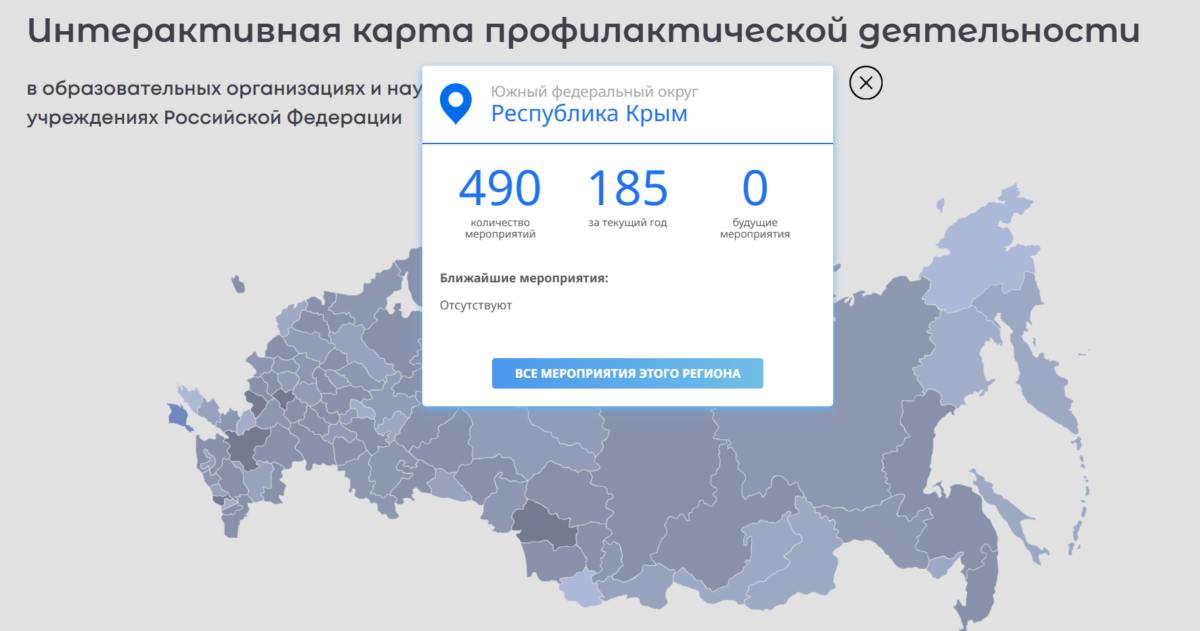

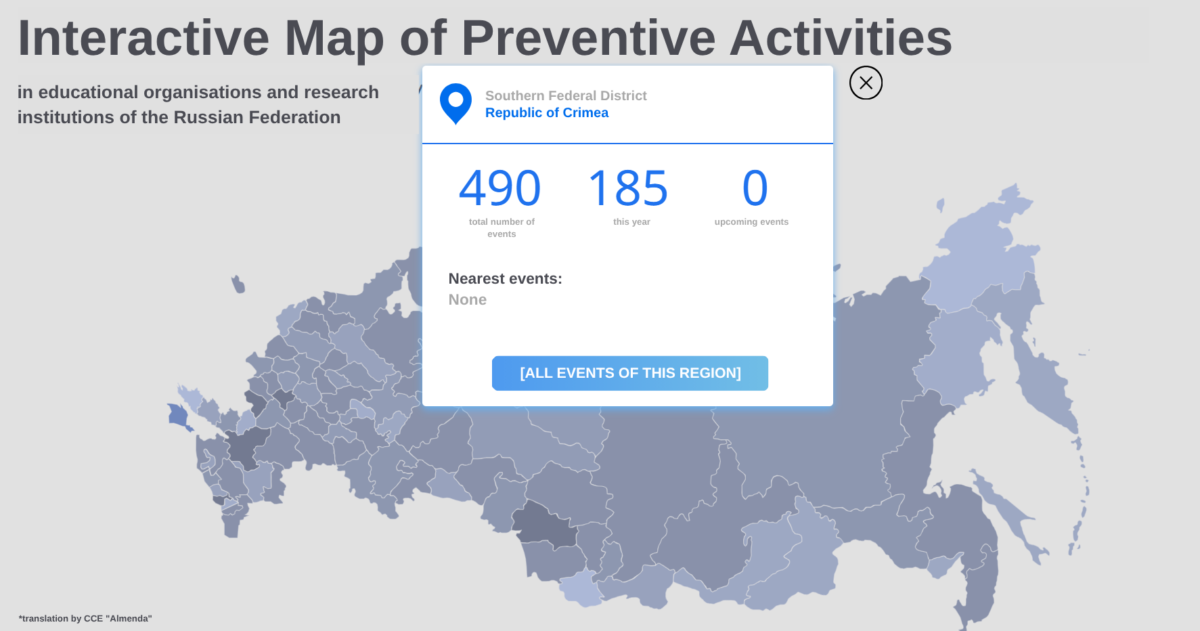

In the plan of the so-called “V.I. Vernadsky Crimean Federal University” for the implementation of the activities of the Comprehensive Plan, signed by Gubanova, the Coordination Centre is listed as one of the key implementers for almost every activity. Particular attention is drawn to the explicitly anti-Ukrainian orientation of certain activities. In particular, the document provides for:
- “Conducting patriotic events aimed at drawing the attention of learners to the heroic stories of the University’s students and staff, regarding the awarding of the names of Heroes of the Russian Federation who distinguished themselves in the combating terrorism, primarily against Ukrainian nationalist and neo-Nazi formations …” (para. 1.1);
- “Carrying out preventive activities … aimed at exposing the criminal nature of terrorist, Ukrainian nationalist and neo-Nazi organisations” (para. 1.3.1).
In addition, the document provides for individual “preventive activities” with underage students who had “come under the influence of Ukrainian nationalist and neo-Nazi structures”, as well as large-scale information campaigns involving “opinion leaders” to foster a negative attitude towards terrorism, “Ukrainian nationalism and neo-Nazism”. This implies systematic monitoring of students’ online activity and statements in order to prevent any alternative viewpoints and to promote exclusively Russian propagandist narratives. In particular, for these purposes, a youth volunteer group called the “Internet Patrol” was created at the so-called “V.I. Vernadsky CFU” to search for unlawful information on the Internet.
Specific events
- September 2024 — a round table for students from the “new regions”, dedicated to the so-called “Day of the Coat of Arms and Flag of Crimea”.
- Organiser: Coordination Centre of “CFU”, moderator – Olena Gubanova.
- Topics: “legitimacy of the return of the DPR, LPR, Zaporozhie and Kherson Oblasts to Russia”, “traditional values”, “national unity”.
- 16 June 2025 — an advanced training course for educators, youth workers, and representatives of religious and national-cultural organisations.
- Topic: “Methods of preserving and strengthening traditional Russian spiritual and moral values and preventing destructive ideology”.
- Organiser: Coordination Centre of “CFU”.
- Speakers: lecturers from the Department of Russian Statehood at the so-called “V. I. Vernadsky CFU”.
- 3 September 2025 — regional forum dedicated to the Day of Solidarity Combating Terrorism.
- Co-organiser: Coordination Centre of “CFU”.
- Participants: representatives of the occupation authorities, security agencies, participants of the so-called “special military operation”, and 30 students delegated to the event by the Crimean Coordination Centre.
- Programme: speeches on “civic identity” and “countering the ideology of extremism”, among other topics.
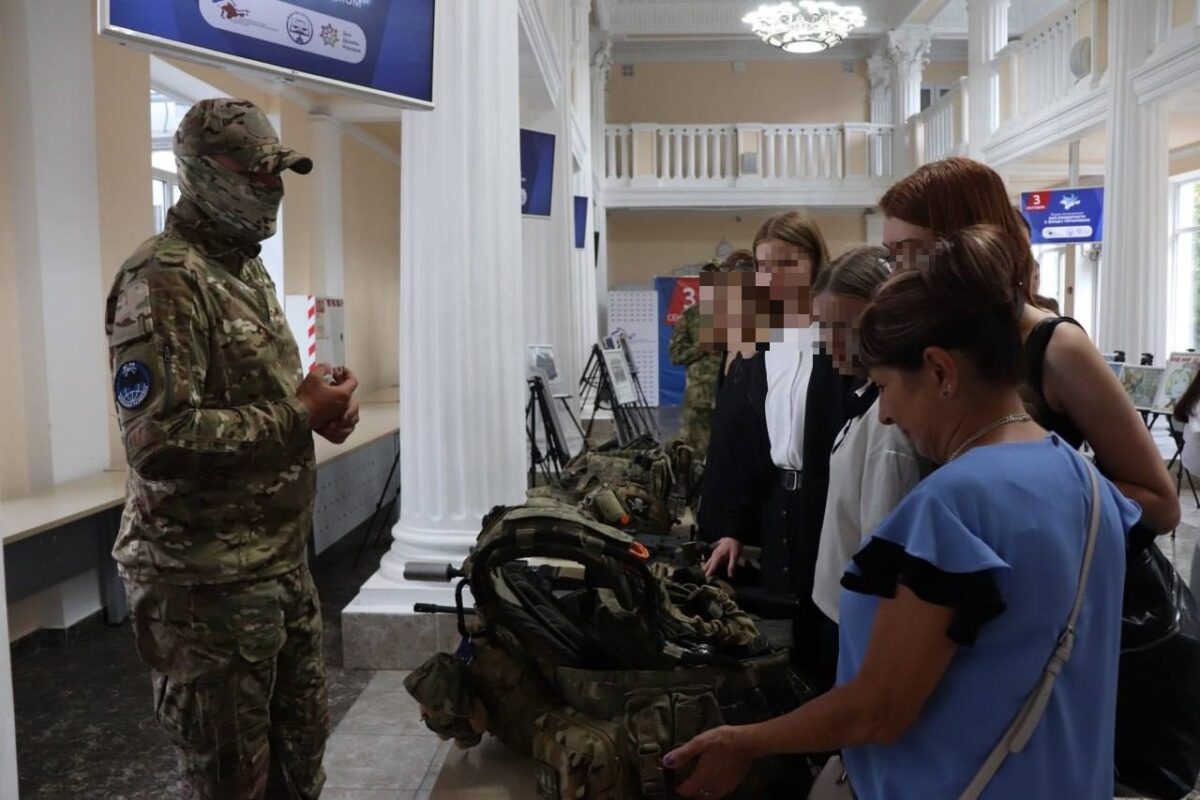

- 3 September 2025 — All-Russian Teleconference “Path to Salvation”.
- Participants: students and staff of the Pribrezhny Agrarian College.
- Topics: “prevention of terrorism and its cyber forms”, “defence of Russian civilisation in the context of the special military operation”, and anti-terrorist security in educational institutions.
These are only a few examples demonstrating that the “CFU” Coordination Centre is consistently used as a tool for spreading Russian ideological narratives in the TOT of the AR of Crimea under the guise of “combating extremism and terrorism”.
Coordination Centre in the TOT of the city of Sevastopol: leadership and activities
Head of the Sevastopol State University Coordination Centre: Andrey Mikhailovich Puzanov (pictured below).
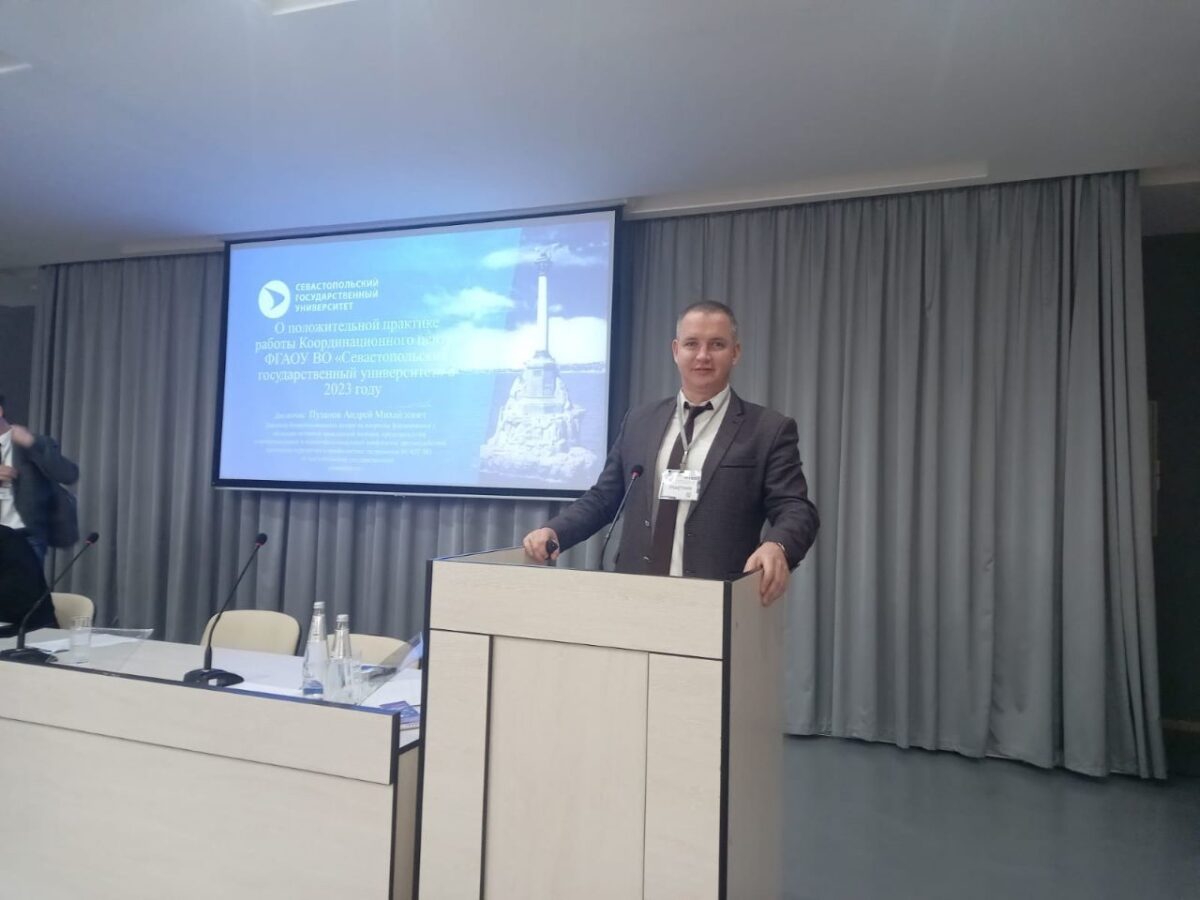

There is no detailed biography of the head available in open sources, but his publications are revealing. In a co-authored “academic” article, Andrey Puzanov explores the “origins of Ukrainian nationalism”, portraying it as part of the “Western Russophobic discourse” and an “instrument against Russia”. In his report on the “threats” to the information security of young people and ways of countering them, Puzanov cites examples of Ukrainian “fake news and manipulations” related to the so-called “special military operation”, some of which were allegedly uncovered by the Coordination Centre under his leadership.
The powers of the Sevastopol Centre are similar to those of the “CFU” Coordination Centre. At the so-called “Sevastopol State University”, there is also a volunteer association that monitors “prohibited or extremist content” on social media and messaging platforms – the “Cyber Agents of Information Security”.
The staff of the Coordination Centre in the TOT of Sevastopol received a letter of appreciation from the Ministry of Science and Higher Education of the RF, and the Centre was also recognised as a winner of the all-Russian competition “Best in Prevention” organised by the National Centre for Patriotic and Historical Education of Youth.
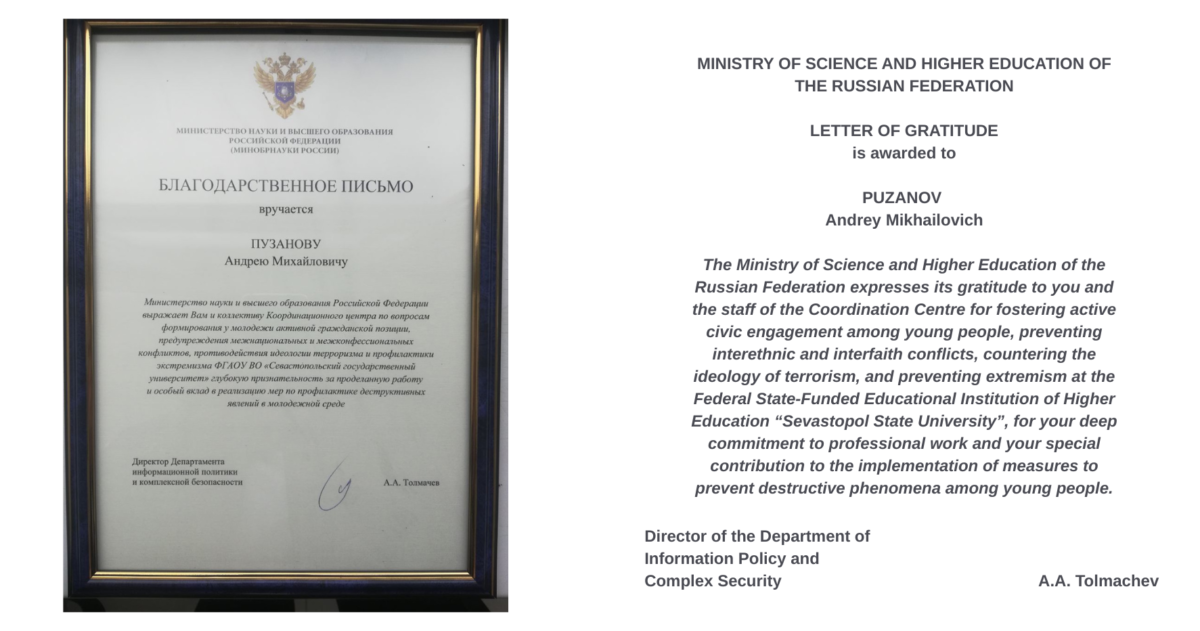

Specific examples of “preventive activities” of the Sevastopol Coordination Centre
- Screening of the film “Donbas. The Suffering Heart of Russia”. Students were shown a film that presents the war against Ukraine as a “struggle for the liberation of Donbas”. The event was designed to instil in young people the notion of Russia’s “sacrifice”, to justify its aggression, and to shift responsibility for the war onto Ukraine.
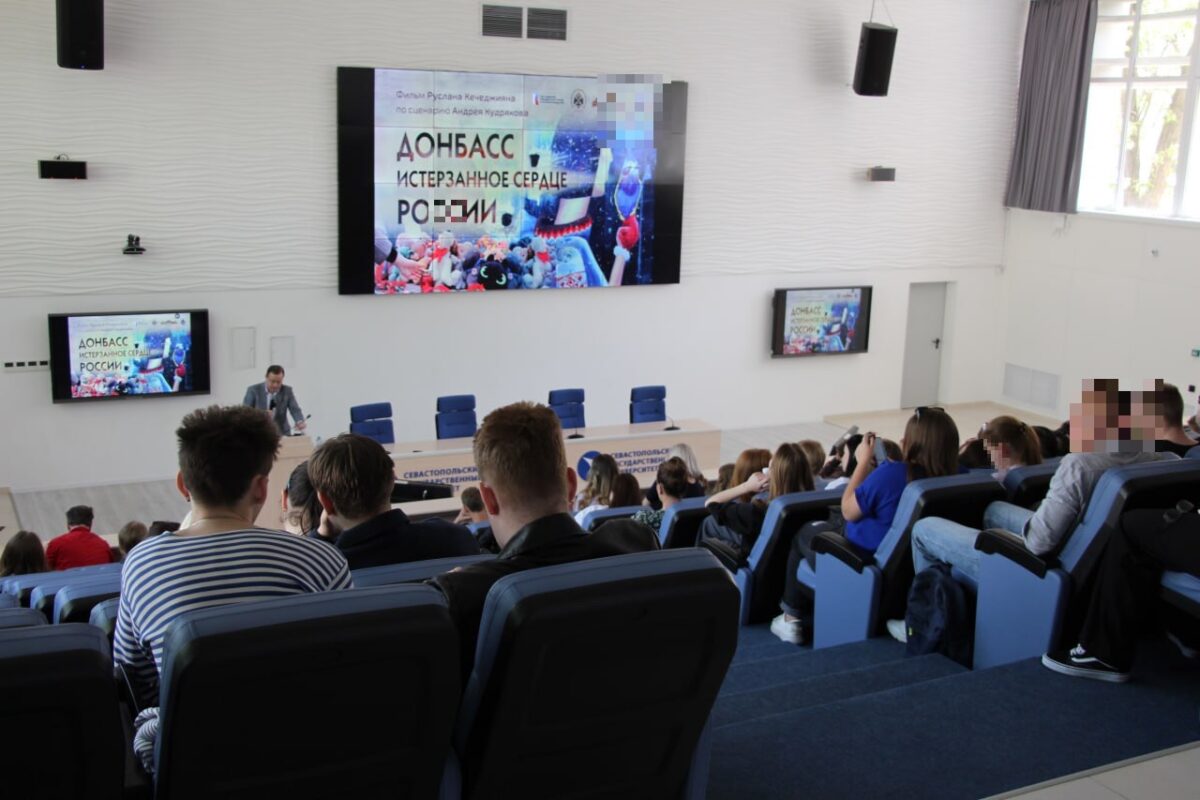

- A meeting with students dedicated to the “heroic deeds of the defenders of the Fatherland” of the past and present. It featured a Russian serviceman fighting against Ukraine, who shared his experience of combat. He spoke about the preconditions and reasons for the so-called “special military operation”, his role in the “protection of the civilian population” of the so-called “Donetsk and Luhansk People’s Republics” since 2014. Such events impose glorified stories of participants in Russian aggression as role models. Their purpose is to instil in students the notion of military service as the highest form of civic responsibility.
- Presentation of a book by the Investigative Committee of the RF on the “crimes of the Ukrainian regime”. The publication is used as a propaganda tool, accusing Ukraine of carrying out “punitive operations” since 2014 against the civilian population of “Donbas and other regions”. These claims were presented as if they were scientifically and legally verified facts, intended to give students the impression of credibility and to be accepted without question.
The so-called “coordination centres for the preventionof extremism” in occupied Crimea form part of the systemic policy of the RF aimed at total ideological control over children and young people. Under the guise of “combating terrorism and extremism”, these structures in fact function as instruments of Russification, persecution of dissenters, and the imposition of an “all-Russian identity”. Any manifestations of Ukrainian culture and national identity in the temporarily occupied territories are treated as a threat, while the younger generation is subjected to systematic re-education through schooling, “preventive activities”, and propaganda.
The operation of these centres in the TOT of the Autonomous Republic of Crimea and the city of Sevastopol cannot be regarded as educational or preventive activity. Under the slogan of “countering extremism”, they carry out persecution on the grounds of nationality, forced assimilation, and the imposition of the ideology of the occupying state, in direct violation of international humanitarian law and the Convention on the Rights of the Child. This activity forms part of a deliberate system that shows signs of war crimes and crimes against humanity, and constitutes a gross violation of both international human rights standards and national criminal law.
Such actions must be given an appropriate legal assessment under both international and national law and considered when holding the Russian Federation and specific officials accountable.
Material was prepared by the Center for Civic Education “Almenda” within the framework of the project “Defending Identity: Protecting Ukrainian Children in Occupied Territories”. The content of this document is the sole responsibility of the Public Organization “Center for Civic Education “Almenda” and does not necessarily reflect the position of Civil Rights Defenders.


